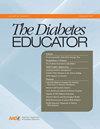State and Trait Anxiety and Diabetes Outcomes in Youth With Type 1 Diabetes
IF 3.9
Q1 Health Professions
引用次数: 7
Abstract
Purpose The purpose of this exploratory pilot study was to examine the associations of state and trait anxiety with glycemic control, self-management, and diabetes-specific quality of life (QOL) in youth 10 to 16 years of age with type 1 diabetes (T1D). Methods Bivariate Pearson correlations and multiple linear regression modeling were conducted to examine the relationship among anxiety symptoms, hemoglobin A1C (A1C), self-management, QOL, and covariates. Results A sample of 67 adolescents was 50.7% female, and 87.1% were non-Hispanic white, with a mean ± SD age of 13.4 ± 1.85 years and an A1C of 8.3% ± 1.2% (67 mmol/mol). Higher state anxiety was correlated with older age. Better self-management was correlated with lower trait anxiety and lower state anxiety. Higher state and trait anxiety were associated with poorer self-management. Higher state anxiety was associated with higher A1C. Higher trait anxiety was associated with poorer diabetes-specific QOL. Conclusions State and trait anxiety may differentially affect diabetes outcomes. State anxiety may be a modifiable target for physiologic (A1C) and psychosocial (QOL) outcomes in youth with T1D, while trait anxiety may be a modifiable target for psychosocial outcomes (QOL). Anxiety symptoms should be assessed at regular clinic visits. Interventions to improve anxiety symptoms may in turn improve physiologic and psychosocial outcomes.青少年1型糖尿病患者的状态、特质焦虑与糖尿病预后
目的本探索性试点研究的目的是检验10至16岁1型糖尿病(T1D)青年的状态和特质焦虑与血糖控制、自我管理和糖尿病特异性生活质量(QOL)的关系。方法采用双变量Pearson相关和多元线性回归模型,检验焦虑症状、血红蛋白A1C(A1C)、自我管理、生活质量和协变量之间的关系。结果67名青少年中,50.7%为女性,87.1%为非西班牙裔白人,平均±SD年龄为13.4±1.85岁,A1C为8.3%±1.2%(67mmol/mol)。较高的状态焦虑与年龄较大相关。更好的自我管理与较低的特质焦虑和较低的状态焦虑相关。较高的状态和特质焦虑与较差的自我管理有关。较高的状态焦虑与较高的A1C相关。较高的特质焦虑与较差的糖尿病特异性生活质量相关。结论状态焦虑和特质焦虑可能对糖尿病的预后产生不同的影响。状态焦虑可能是T1D青年生理(A1C)和心理社会(QOL)结果的可改变目标,而特质焦虑可能是心理社会结果的可修改目标。焦虑症状应在定期就诊时进行评估。改善焦虑症状的干预措施可能反过来改善生理和心理社会结果。
本文章由计算机程序翻译,如有差异,请以英文原文为准。
求助全文
约1分钟内获得全文
求助全文
来源期刊

Diabetes Educator
医学-内分泌学与代谢
CiteScore
4.00
自引率
0.00%
发文量
0
审稿时长
6-12 weeks
期刊介绍:
The Diabetes Educator (TDE) is the official journal of the American Association of Diabetes Educators (AADE). It is a peer-reviewed journal intended to serve as a reference source for the science and art of diabetes management.
TDE publishes original articles that relate to aspects of patient care and education, clinical practice and/or research, and the multidisciplinary profession of diabetes education as represented by nurses, dietitians, physicians, pharmacists, mental health professionals, podiatrists, and exercise physiologists.
 求助内容:
求助内容: 应助结果提醒方式:
应助结果提醒方式:


